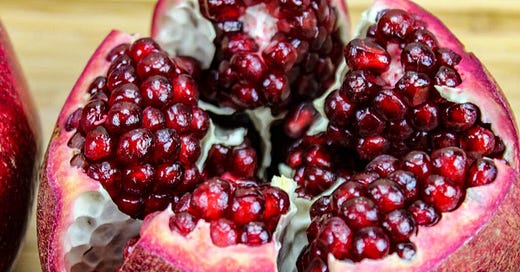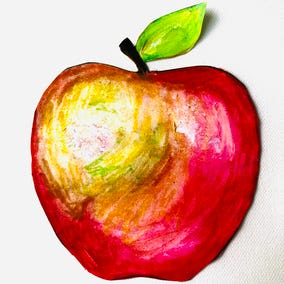I am not alone, I know, in hating the enforced sociability of ice breakers. All the same, on 3rd January I invited several hundred participants to answer the time-honoured ice-smashing question “If you were a fruit, what fruit what you be?”
Four years ago, Kim and I decided that January Writing Hours would not be recorded, and the chat would not be saved. We wanted the hours to be a place of unselfconscious creation and play, a place of experimentation, and we knew that saving the thoughts, quips, links and poetry posted in Chat would impact on what participants feel able to share. I’m generally really glad we made this decision, but I regret that I don’t have a copy of the very detailed and specific fruits shared in Chat on January 3rd. I only remember a blue-fungused tangerine at the back of the fridge. So ….
Exercise 1
For your first exercise, please write some more examples of “If I was a Fruit I would Be” and share them in comments. Don’t just write just what fruit is, but also what type, what size, shape, colour, what state of ripeness. Tell me where you might be found: in an orchard, a bowl on a dining room, stacked in a Morrisons warehouse, neglected in a child’s lunch box – in what month, in which town. Would you be shiny or rough, bruised, nibbled? How you would you smell and taste, what texture would you be?
There’s a huge history of fruit in poetry and literature, where it has symbolised everything from sexuality and knowledge to innocence, from abundance and fertility to death. One of the most famous examples is the forbidden fruit in the Garden of Eden. Despite the common contemporary assumption that it was an apple, this was actually never specified in the Bible and it’s been depicted as a grapefruit, grapes, a pomegranate, a fig, carob, or - with Emily Dickinson's characteristic single mindedness - a pea.
LXXXVII
by Emily Dickinson
Forbidden fruit a flavor has
That lawful orchards mocks -
How luscious lies the pea within
The pod that Duty locks -
Emily was writing in the first half of the nineteenth century, which accounts for the archaic inversions. Notice the alliteration, how the first line whispers, how the third line pushes your tongue to your lips. Everything in this tight little poem is deliberate, especially the choice of the pea - unremarkable, unshowy, locked in its tight pod, just like the little poem —and yet bursting with life and potential, like Emily.
Exercise:
Emily's poem is almost the definition of elliptical - and I'd like you to write elliptically too (though you don’t need to use dashes!) Just think of a fruit that was forbidden to you - and write about it as a fruit. Never, ever name what that fruit represents.
Like Emily, Imtiaz Dharker is one of the giants of poetry, and she's also one of the kindest, warmest people you could ever hope to meet. She's also a fantastic visual artist. She was born in Lahore, Pakistan, and its colours and flavours and stories run throughout her poetry, especially this one.
How to Cut a Pomegranate
by Imtiaz Dharker
Never,' said my father,
'Never cut a pomegranate
through the heart. It will weep blood.
Treat it delicately, with respect.
Just slit the upper skin across four quarters.
This is a magic fruit,
so when you split it open, be prepared
for the jewels of the world to tumble out,
more precious than garnets,
more lustrous than rubies,
lit as if from inside.
Each jewel contains a living seed.
Separate one crystal.
Hold it up to catch the light.
Inside is a whole universe.
No common jewel can give you this.’
Afterwards, I tried to make necklaces
of pomegranate seeds.
The juice spurted out, bright crimson,
and stained my fingers, then my mouth.
I didn't mind. The juice tasted of gardens
I had never seen, voluptuous
with myrtle, lemon, jasmine,
and alive with parrots’ wings.
The pomegranate reminded me
that somewhere I had another home.
If I were to think of a fruit that symbolised my home, it would probably be the raspberries in our backyard in Burnley which ripened too quickly, or the bilberries we pick on the moors. The pomegranate grows in Iraq, Iran, Pakistan, Afghanistan and China, and also has a strong association with Granada, in Spain. It’s a potent symbol, and it appears in every major religion, in medicine and art. In this poem, its a dream-like evocation of a lost home, or Paradise, which is loved for being exactly itself.
I love the repetition of the first word, Never. It feels strict, and harsh, and then turns into a unexpected statement of delicacy and respect – we’re drawn in and ready for the second stanza , which is simple and descriptive and sentimental. The tone of Imtiaz’ poem reflects her father’s voice; a style of writing which reflects the home territory of the pomegranate.
Exercise:
Your challenge is to think of a fruit, how it looks before and after it has been cut open, and how it tastes. Think about where and how it grows, and what it makes you think of. You may choose to write a poem in the style of Imtiaz Dharker, or you can explore the fruit in another way and in any form you wish. Whichever you choose, your poem should appeal to the senses.
Twenty years years ago, I attended my first Arvon residential - thanks to a full grant. One of the other students on the course asked me which poets I liked, and I told them, with great enthusiasm, that I was a big fan of Brian Patten whose “Love Poems” I’d read and re-read so often I knew them off by heart. Her response? “Oh dear”. I never challenged her on this, or asked her to explain her response. I guess I already felt out of my depth, out of place. So I quietly accepted that my reading wasn’t complex, or intellectual, or contemporary enough.
No one should ever, ever be made to feel embarrassed for the poetry they read. Poetry is not a competition. Having said that, I'd love to speak to that student now, and ask them which major poetry publisher they are with … and how many collections they've published.
Take it away, Brian.
The Stolen Orange
by Brian Patten
When I left I stole an orange
I kept it in my pocket
It felt like a warm planet
Everywhere I went smelt of oranges
Whenever I got into an awkward situation
I'd take out the orange and smell it
And immediately on even dead branches I saw
The lovely and fierce orange blossom
That smells so much of joy
When I went out I stole an orange
It was a safeguard against imagining
There was nothing bright or special in the world
You don't have to like every poem you read, just as we don't like every piece of music we hear. But it's hard to imagine what's there is to dislike about this deceptively simple poem which allows itself to burst into light – and flight – in its language and imagination. The best poems - like this little gem - are rarely all light or all dark. I love how its simple, sentimental message is grounded in a sense of struggle, and hardship - why did he steal the orange? What did the dead branches stand for, and where did he step out from? Why did he need the safeguard of the orange?
Exercise:
What is your safeguard against imagining there is nothing bright or special in the world? Choose something you can put in your pocket. Include some shadows, so that we can appreciate how bright the light shines - or vice versa.
We would be delighted if you share some of your responses in comments. And as usual, here’s a big thanks to everyone, especially our paid subscribers - we'll be sharing some bonus content with you very soon.






What great prompts Clare- thank you for sharing. i don't currently have the headspace to respond to them or any of the questions but just to say Brian Patten was one of the 1st poets i loved and was probably largely responsible for me starting to write myself so i'm with you there!
Another fab u lous post. Thank you. My fruitbowl’s overflowing today. Sharing newly prepped fruit poem from Bob Beagrie with his permission.
She Eats a Pomegranate
Kneeling before the hearth,
having built a fire, ready to light,
she scoops up a cluster
of cool, plump, scarlet seed sacks
with her right hand, studies them
tumbled about the creases of her
cupped palm, nestled in the gullies
between fingers, shining translucent -
a pile of tiny hearts, the eyes of a flock
of Victoria Crowned Pigeons,
before tilting back her head, dropping
them into her mouth, like a giantess
devouring babies in one of Goya's nightmares,
and I know that somewhere in her dreams
she has chewed upon whole armies.
They are sweet and slightly tart,
the seeds hard as little skulls and she picks
them out and flicks them into the waiting
kindling the way I imagine a creator god
positioned the first stars in the night sky.
Her hair is all of the shadows ready
to be shared out among substances
each to bear their own until they are no more,
streaked by hoar frost and freezing fog.
She crushes one seed between her molars,
the grinding of continental plates,
scoops another cluster of shrapnel
she has spilled from the burst grenade -
cooled dewdrops of blood, vampire tears
drawn by the melancholy of longevity,
each berry a soul, a sin, a dark lineage,
a month bargained against the summer.
Last night's snowfall has melted,
a foghorn bellows beyond the cliffs,
missiles fall on a penned-in population.
She knows this world is both more and less
than a billionaire's battle-ground and we
are only told whatever we need to know.
She licks the juice from her lips,
pushes the bowl aside, bored
by the taste of the husk-stored fruit,
she strikes a match to set the dry stack alight.
It flares, glows, the tinder fizzles as it takes
and splashes golden light across her face.
Early January's underground world
always requires a women to break open
a pomegranate, to lever out its goodness
with a spoon, to hollow out the casing
until its chambers echo like a seashell.
I watched her do it, grimacing, applying
elbow grease, prying the rubies loose.
Now it's as if the bulbous discarded husk
has grown and encased us, shutting out
the universe with its terrors and tediums;
until there is only her feeding the fire
beside a bowl of crimson berries
and me watching, wanting, hardly
breathing so as not to break the spell.